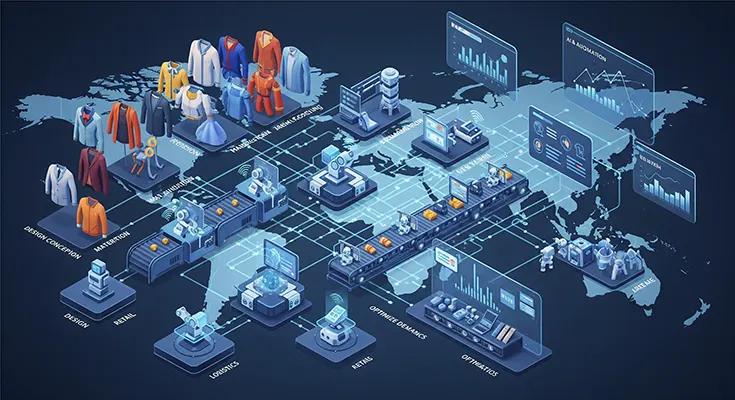Artificial Intelligence (AI) and automation have emerged as transformative forces in the realm of global fashion supply chain management. As the fashion industry navigates the complexities of a rapidly evolving global market, the integration of AI and automation technologies has reshaped traditional supply chain processes, offering unprecedented opportunities for efficiency, sustainability, and innovation.
Streamlined Production Planning and Forecasting
AI-powered predictive analytics and machine learning algorithms enable fashion brands to enhance their production planning and forecasting capabilities. By analyzing historical data, consumer behaviors, and market trends, AI technologies can generate accurate demand forecasts, allowing fashion companies to optimize inventory levels, minimize overstocking, and reduce the risk of excess inventory. Thus, AI-driven production planning drives operational efficiency and economic sustainability within the supply chain.
Enhanced Sourcing and Supplier Management
In the global fashion supply chain, AI and automation facilitate intelligent sourcing and supplier management. These technologies enable real-time monitoring of supplier performance, quality control, and compliance standards. Through automated supply chain monitoring, vendors can be evaluated based on predetermined parameters, thereby ensuring adherence to ethical labor practices, environmental regulations, and product quality standards. AI-driven insights empower fashion companies to make informed decisions that align with their sustainability and ethical sourcing initiatives.
Efficient Inventory Management and Fulfillment
AI and automation play a pivotal role in optimizing inventory management and order fulfillment processes. By leveraging predictive analytics and machine learning, fashion retailers can accurately forecast consumer demand, deploy dynamic pricing strategies, and manage inventory levels with precision. Additionally, automated fulfillment centers equipped with robotics and AI-powered logistics systems streamline order processing, improving efficiency, and reducing lead times. These advancements enable fashion brands to meet customer expectations for rapid delivery while minimizing operational costs.
Sustainable and Ethical Practices
The integration of AI and automation in the global fashion supply chain has facilitated progress toward sustainable and ethical practices. AI technologies enable the tracking of raw material provenance, carbon footprint analysis, and sustainability assessments across the supply chain. By automating the monitoring of sustainability metrics, fashion companies can enforce responsible sourcing, energy efficiency, and waste reduction, aligning with increasingly stringent environmental regulations and consumer preferences for eco-conscious products.
Demand-Driven Design and Personalization
AI and automation have revolutionized fashion supply chain dynamics by enabling demand-driven design and personalized manufacturing capabilities. With AI-powered trend analysis and consumer profiling, fashion brands can design and produce customized products that resonate with individual preferences. Through automated design customization and decentralized manufacturing processes, fashion companies can minimize waste, reduce excess inventory, and respond directly to consumer demand, infusing agility and responsiveness into the supply chain.
Future Opportunities and Challenges
As AI and automation continue to evolve, the global fashion supply chain stands to benefit from advanced technologies such as autonomous vehicles for logistics, robotic manufacturing, and blockchain for supply chain transparency. However, the widespread adoption of AI and automation also presents challenges regarding workforce displacement, data security, and the ethical implications of autonomous decision-making within the supply chain.
AI and automation have significantly reshaped global fashion supply chain management, offering unprecedented opportunities to drive efficiency, sustainability, and innovation. By leveraging AI-powered predictive analytics, automation technologies, and sustainable practices, fashion companies can navigate the complexities of the global market while embracing agility, transparency, and ethical responsibility within the supply chain.





